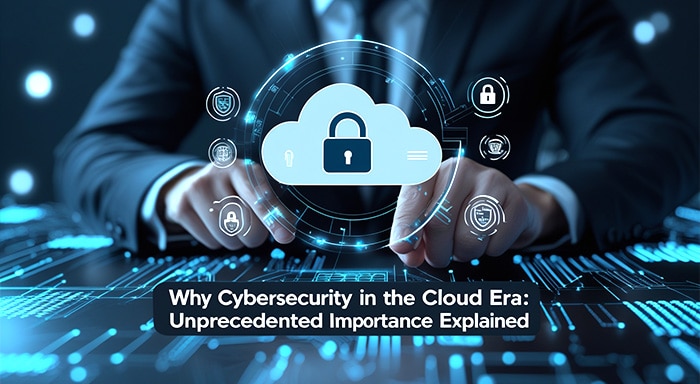Cybercrime is getting worse. Primarily, it is becoming increasingly difficult for businesses to safeguard their data with so many systems now present in the cloud. Even a minor breach can lead to loss of thousands if not millions of dollars. Not only does it lead to financial losses but also hampers the reputation and reliability of the businesses.
If safeguarding your business is your main concern, then you are not alone.
Why cybersecurity is more critical than ever in the cloud era isn’t merely a question—it’s a reality. Issues like ransomware attacks, data leaks, and bad security configurations could lead to recurring security issues for companies of all levels.
One effective way organizations are strengthening their defenses is by deploying endpoint security solutions that provide advanced threat detection and real-time monitoring. These solutions, designed to mitigate risks posed by malware, phishing, and unauthorized access attempts, are integral in preventing security breaches before they escalate into full-scale cyberattacks. By leveraging enterprise-grade endpoint protection, businesses can minimize vulnerabilities and ensure their critical assets remain secure.
This blog puts emphasis on why businesses should prioritize cybersecurity and gives practical insights on preventing these threats from hampering your business. Explore the following section if you want to protect your systems from cyberattacks!
What is Cybersecurity?
Cybersecurity safeguards the networks, systems, and information from malicious exploitation and unauthorized access. It acts as the digital safeguard for businesses managing confidential client details and vital operations.
With cybercrime costs expected to reach $10.5 trillion annually by 2025, neglecting security measures is not an option for any company today.
Hackers have various methods to employ that can weaken your defenses. These may include social engineering, ransomware attacks, and phishing methods. For instance, a well-designed phishing email can deceive employees into granting access to protected files within moments.
**"It only takes one weak link in your chain,"** experts caution repeatedly when discussing these concerns with business owners and IT managers globally.
The Role of Cybersecurity in the Cloud Era
Businesses now depend on cloud platforms for data storage and processing. This shift generates new risks, making cybersecurity prime focus. Hackers often leverage weakly secured configurations or gaps in cloud platforms to get access to confidential data.
For example, misconfigured databases exposed 540 million Facebook user records in 2019. The phenomenal popularity of the Internet of Things (IoT) also raises these issues, as many IoT devices do not have sufficient protection.
Devices that are compromised can often cause extremely destructive DDOS (distributed denial of service), severely impacting processes for long periods.
Artificial Intelligence (AI) both aids and challenges cybersecurity efforts today. It makes the defenses strong by recognizing patterns that might indicate potential breaches quicker than humans can.
However, it also provides cyberattackers with sophisticated platforms to develop more advanced malware having the potential to bypass robust security systems. Businesses must prepare for these dual threats, especially since any breach can harm their reputation and trust with clients overnight.
In this era heavily reliant on digital connections, protecting business assets has become more important than ever before.
What Is the Importance of Cybersecurity Today?
Cybersecurity acts as a layer of defense between your business and possible disruption.
Protection of Sensitive Data
Hackers exploit the importance of sensitive data. Personal information like banking details or Social Security numbers are often the primary target for fraud or potential identity thefts. For example, the 2017 Equifax breach exposed the private information of approximately 147 million people. It indicates how devastating breaches can be for both individuals and businesses.
"Data isn't safe unless it's defended constantly." — is a tough lesson many companies have learned. Strict regulations like GDPR in Europe require businesses to focus on security or face significant fines.
Safeguarding this information extends well beyond just protecting customers; it is greatly important for safeguarding credibility of the business as well.
Safeguarding Business Reputation
A single data breach can harm a company's reputation instantly. In 2021, IBM reported the average cost of a breach reached $4.24 million, but the impact goes far beyond finances. Most customers lose their trust in organizations when they fail to protect their sensitive data, making them shift toward the competitors.
Ransomware attacks are another reputational risk. Businesses not only face significant recovery costs—averaging $1.85 million per incident—but also public criticism for insufficient security measures.
A damaged reputation of a brand often takes several years to redevelop, often leading to lost partnerships or opportunities. Establishing robust cybersecurity in the business environment nowadays is imperative for staying reliable.
Compliance with Regulatory Standards
Failing to meet regulations can result in expensive fines and lawsuits. Rules like GDPR in the EU safeguard personal privacy, necessitating strict data handling practices for businesses. For more smart insights on how compliance impacts industries, check out Credibly's blog to explore sector-centric advantages and strategies.
Managed IT services must remain up-to-date with these standards to prevent penalties or breaches. Governments now provide vital resources for cybersecurity measures while also boosting cooperation between private and public sectors.
In 2023, institutions like SNHU were acknowledged by prominent organizations such as the NSA for emphasizing compliance in education. Businesses who don’t pay attention to these evolving rules often risk their financial growth and reputation damage.
Staying compliant with updated regulations makes sure that the sensitive data remains well protected and operations are well secured under enhanced regulatory oversight today.
Common Cloud Security Threats
Hackers constantly seek new ways to exploit cloud vulnerabilities. Missteps in security settings or weak points in systems can open the door to serious troubles.
Cloud Misconfigurations
According to studies, misconfigurations make up over 65% of cloud-related security incidents today. Forgetting minor details during setup or lacking technical skills can lead to breaches that hackers exploit quickly. Businesses looking to improve their cloud security setups can see more testimonials from experts to learn about effective solutions and strategies.
According to studies, misconfigurations make up over 65% of cloud-related security incidents today. Forgetting minor details during setup or lacking technical skills can lead to breaches that hackers exploit quickly.
Companies depending on IoT often face even higher challenges as close interconnection of devices raises the number of vulnerabilities. Without regular checks and trained teams, these gaps can greatly reduce with time. It is important for businesses to ensure continuous learning of their IT department to minimize such risks effectively.
API Vulnerabilities
APIs function as connectors, linking applications to exchange information. However, there is great possibility that these connectors can become effective access points for cyberattacks. Poorly constructed or insecure APIs risk exposing confidential information to hackers.
Cybercriminals often take advantage of flaws in authentication methods or insufficient encryption protocols.
A single API-enabled breach can put the entire system in jeopardy. For instance, attackers might gain access to private customer data or internal tools of the business. Companies depending on cloud services cannot afford such risks.
Identifying this threat helps in executing effective measures against DDoS attacks.
DDoS Attacks
Hackers overwhelm a network with excessive traffic to crash systems during distributed denial-of-service (DDoS) attacks. IoT devices that are compromised sometimes act as catalysts for these attacks, converting everyday gadgets into disruption tools.
For businesses depending on cloud services, these interruptions can bring the operations to a complete halt.
Global cybercrime costs could reach $10.5 trillion annually by 2025, partly driven by such large-scale attacks. DDoS incidents don't solely target large corporations; they also pose serious risks to smaller enterprises using managed IT services.
Downtime from one attack harms reputations and deters potential customers more quickly than expected.
Future Trends in Cloud Security
Cybersecurity is continuously evolving and becoming more efficient in thwarting rising cyber threats. It is important for the businesses to stay sharp as new approaches and tools come up in cloud security.
Zero Trust Architecture
Zero Trust Architecture completely redefines traditional security approaches. It operates on the principle of "never trust, always verify." This method safeguards cloud environments by ensuring rigorous authentication for every device and user.
Companies who adopt this model attain more robust defenses against ransomware attacks, which have greatly increased in recent times.
Its application extends beyond just simple access control. Zero Trust complies to regulations like GDPR to greatly improve compliance. With AI and machine learning built into the system, it identifies threats more quickly than older techniques ever managed.
As interest increases, organizations need experts specifically trained for cloud-oriented cybersecurity strategies such as Zero Trust Architecture.
Cybersecurity Mesh
Cybersecurity Mesh restructures security to fit modern, distributed networks. Instead of centralized control, it creates small, interconnected security nodes. Businesses can safeguard cloud applications as well as remote work setups more efficiently this way.
This approach is greatly significant for responding quickly to threats without disrupting any operations.
Companies leveraging a cybersecurity mesh establishes more robust defenses around particular assets like data layers and applications. For instance, a breach in one section won't compromise the entire network.
Managed IT services find this particularly useful for protecting sensitive client information. This evident change demonstrates why cybersecurity has become more vital than before in this cloud era!
Conclusion
The cloud era has transformed how we approach our security. Threats are more defined, attacks are quicker, and the stakes are greater. Safeguarding data is no longer optional; it's essential for survival.
It is important for the businesses to stay vigilant and upgrade their defenses before disaster happens. Cybersecurity isn't just important – it's absolutely necessary.








